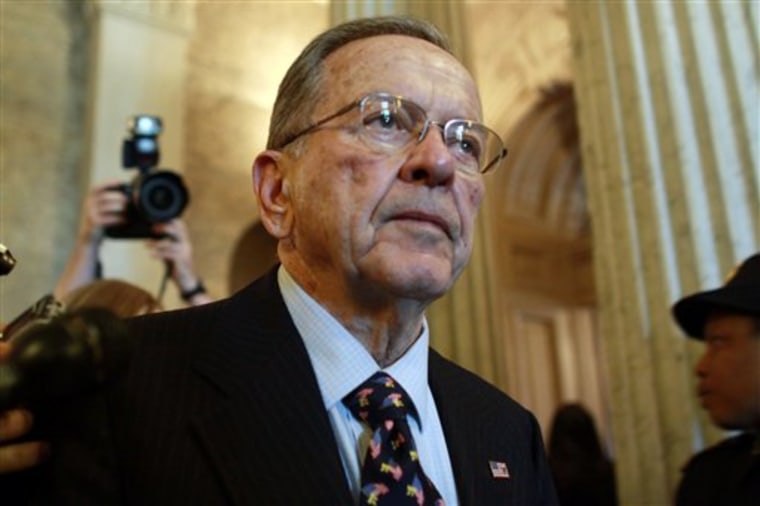If, as expected Tuesday, a federal judge agrees to dismiss corruption charges against former Sen. Ted Stevens, it will wipe away the Alaska Republican's conviction and complete an embarrassing unraveling of the Justice Department's case.
But the dismissal will not declare Stevens innocent. Nor will it rewrite the facts of a case in which Stevens took thousands of dollars in favors and freebies from wealthy friends.
Stevens, who was the Senate's longest-serving Republican, was convicted in October of seven counts of concealing home renovations and other gifts from Senate financial documents.
Attorney General Eric Holder decided to dismiss the case after discovering that a key witness had made inconsistent statements and that the value of Stevens' renovations might have been far less than prosecutors contended in court. It was the final straw for a prosecution team that repeatedly mishandled witnesses and evidence.
If the case is thrown out, nobody will ever know how jurors would have reacted had they seen all the evidence, including the lower estimates for home renovations.
"He still had gifts he received," juror Colleen Walsh said Monday.
Gifts he received
Those that came to mind, she said, were the $2,700 massage chair, a custom stained-glass window worth $3,200, and a $29,000 fish sculpture. None of those had anything to do with the home renovations or the disputed testimony.
"All those he still did not claim" on Senate forms, said Walsh, who said the new evidence might have saved Stevens on a few counts, but not others.
Stevens and his supporters responded to the Justice Department's admission as if it pronounced his innocence.
"I always knew that there would be a day when the cloud that surrounded me would be removed," Stevens said. "That day has finally come."
Friends talked about Stevens, 85, re-emerging in public life as an elder statesman. Alaska Republicans, including Gov. Sarah Palin, called for his Democratic successor, Sen. Mark Begich, to resign to give Stevens an election do-over.
"His name is cleared," defense attorney Brendan Sullivan declared. "He is innocent of the charges as if they had never been brought."
Rejection of defense
There was no mention of the fact that jurors unanimously rejected Stevens' defense.
At trial, he said he didn't disclose the items he received because they were not gifts. The massage chair, for instance, remained in his house for seven years but Stevens said it was a loan. He said he assumed the stained-glass window was paid for, since his wife takes care of such things. The fish statute was a donation to his foundation, he said, and only remained on his front porch because that's where the donors shipped it.
Jurors convicted him on all of that, and none of it would have been changed by the newly discovered evidence.
The new evidence undercut the testimony of contractor Bill Allen, the government's star witness. Allen testified that his employees performed hundreds of thousands of dollars in work on Stevens' house. Allen also recalled a conversation in which a mutual friend said Stevens didn't intend to pay for the work and only wanted a bill to keep up appearances.
Prosecutors now acknowledge that Allen had no recollection of such a conversation when interviewed a few months before trial. And the value of the renovations, Allen told investigators, might have been more like $80,000.
Michael Sklaire, a former corruption prosecutor, said the decision to dismiss the case was more about punishing the prosecutors for withholding evidence than about exonerating Stevens. When the case against a drug dealer falls apart, Sklaire said, the charges disappear but the defendant can't really say he's innocent because he still got arrested with drugs.
Unique case
Stevens accepted things and did not disclose them. Jurors said that was criminal. What makes the Stevens case unique, Sklaire said, is that Allen's testimony was essential to many but not all of the charges in the case. Would prosecutors have gone to trial without Allen's now-discredited testimony?
"It was right on the edge of being an ethics matter and a criminal case," Sklaire said.
The prosecutors who made the decision to bring the case are now facing scrutiny themselves. An internal Justice Department probe is under way. And U.S. District Judge Emmet Sullivan has ordered authorities to give him the evidence of misconduct that they have gathered.
"There definitely needs to be consequences because prosecutorial misconduct creates a huge erosion in our system of justice," said defense attorney Michael Madigan, a former federal prosecutor.
Hugh Keefe, a Connecticut white-collar defense attorney who teaches trial advocacy at Yale, called the Stevens case "the worst display of unprofessional conduct I've seen in my career."
Despite some of the damaging testimony and evidence that surfaced at trial, Keefe said Stevens and his lawyers are right to assert his innocence. It's up to prosecutors to prove guilt, he said, and they have said they will not try to prove it again.
Besides, Keefe said, the Justice Department's own conduct has overshadowed the case against Stevens. Prosecutors have acknowledged the trial was unfair. If Stevens declares his innocence loudly and keeps the focus on the government, people may forget the unflattering portrait that was painted of him.
